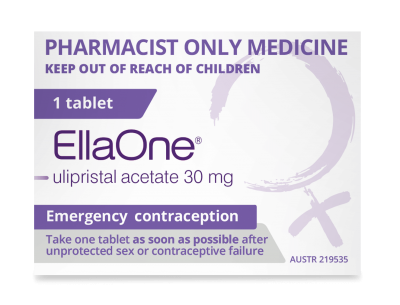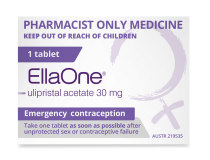

How the morning after pill works and when to use it?
Key facts on EllaOne® and how the morning after pill works
If you’re worried about unplanned pregnancy because you had unprotected sex or your usual contraceptive method failed, it’s time to take a deep breath. You aren’t alone. Like you, many women have gone through this and have turned to emergency contraception to prevent the risk of an unplanned pregnancy. Several emergency contraception are possible for you: you can choose to take the morning after pill, such as EllaOne®, or have a copper IUD (Intra Uterine Device) inserted. Let’s examine the details so you know all your options in order to make a well-informed choice.
1. When should I use emergency contraception?
It’s only normal to worry about the possibility of an unplanned pregnancy after engaging in unprotected sex or when your regular contraception fails. If you find yourself in this situation, you may need emergency contraception. The following circumstances could lead to pregnancy:
The following circumstances could lead to pregnancy:
-
You forgot / were unable to use a method of contraception, like a condom or hormonal contraception.
-
A condom slipped off or tore.
-
Your partner didn’t withdraw in time (AKA “didn’t pull-out in time”).
-
You forgot / were unable to use a method of contraception, like a condom or hormonal contraception.
-
A condom slipped off or tore.
-
Your partner didn’t withdraw in time (AKA “didn’t pull-out in time”).
-
Your diaphragm or cap slips, or you have forgotten to use it.
-
You have forgotten to take your contraceptive pill at the usual time.
-
You have forgotten to apply your contraceptive patch at the usual time.
-
You have forgotten to insert your vaginal ring at the usual time.
Even if your periods are regular and you’re sure your ovulation is either far off or has already taken place, keep in mind that menstrual cycles length and characteristics are never entirely predictable, and that there is no such thing as zero risk.
2. What types of emergency contraception are available to me and where can I buy the morning after pill?
After having unprotected sex*, you have two options to prevent an unplanned pregnancy: you can either take an oral emergency contraceptive or you can have your doctor insert a T-shaped copper IUD inside your uterus.
The first option, the morning after pill, can be purchased at pharmacies; it is also available at family planning centers, clinics, and hospitals. Depending on the emergency contraceptive pill you choose, you have up to 3-5 days to take it in order for it to be effective – EllaOne® is the most effective morning after pill* available in Australia and is the only pill that is effective up to five days.*
The other option, the copper IUD, can be inserted into the uterus by your doctor to prevent fertilization, or to prevent implantation if fertilization has already occurred. In order for this method to be effective, the copper IUD must be inserted within the five days of having unprotected sex.
In either case, the sooner you act, the greater your chances are of reducing the risk of pregnancy!
Learn about the different emergency contraception methods in detail below.
*Note that having sexual intercourse without a condom increases the risk of getting STIs. Make an appointment with your GP if you have any questions or concerns.
3.What is EllaOne®?
EllaOne® is an oral emergency contraceptive pill. Following unprotected sex, or the failure of your regular contraceptive method, a single pill reduces the risk of an unplanned pregnancy. This particular morning after pill should be taken as soon as possible – within (at most) 5 days (120 hours) after having unprotected sex to be the most effective.
Each EllaOne® pill contains 30 mg ulipristal acetate. If you’re lactose intolerant then you should note that each tablet contains lactose (as monohydrate) – talk to your pharmacist or doctor to see if it poses and risks to you. EllaOne® is for occasional use only and does not replace a regular contraceptive method. The ulipristal acetate inhibits or postpones ovulation, that’s why it’s only effective if ovulation has not yet occurred.
4. How does the EllaOne® morning after pill work?
After unprotected sex, sperm travels up the fallopian tubes where they wait for an egg to be released. Since sperm has a maximum lifespan of five days, EllaOne® prevents or delays ovulation until all the sperm have died. It is essential that you take EllaOne® as soon as possible after having unprotected sex in order to maximize its effectiveness.
Keep in mind that it does not induce an abortion so it will be ineffective in cases where a pregnancy is already established.
5. How do I know if EllaOne® has worked?
You will know if EllaOne® has worked at the start of your next period.The majority of women will have their menstrual cycle at their usual time, but the morning after pill can disrupt your cycle, making your period start early or late. This is totally normal, no need to worry.
If your period is more than 7 days late or is unusually light or unusually heavy or if you experience symptoms such as abdominal pain, nausea, vomiting or breast pain or if
you have any doubt about being pregnant, you should perform a pregnancy test to make sure you are not pregnant or see your Health Care Professional. Keep in mind that just like any medication, side effects tend to vary from person to person. Some women report side effects that resemble the early signs of pregnancy, such as nausea, abdominal pain, sore breasts, ect. Although you may be impatient, which is totally understandable, wait 7 days after the expected date of your next period before taking a pregnancy test. If you take one any earlier, the results can be unreliable.
6. What precautions should I take after taking EllaOne®?
If you have sex after taking the morning after pill, you should definitely use a condom until your next period. Just as its name suggests, the oral emergency contraceptive pill is for emergency use only, and is not intended to be used as a regular contraception method.
Some women mistakenly believe that it could replace a regular contraception, or that after taking the morning after pill, they are protected from the risk of pregnancy until the end of their current menstrual cycle. Beware: if you want to have sex after taking an emergency contraceptive pill, use protection (condoms) until your next period! Even if you regularly use a hormonal contraceptive method, such as the pill or patch, you should use a barrier contraceptive method since there was an interruption to your regular contraceptive method and its efficacy may be altered.
Do not breastfeed after taking EllaOne®
If you are a breastfeeding mother, you should avoid breastfeeding for a week after taking EllaOne® . You can continue to milk in order to stimulate and maintain production, but this milk should be thrown away.
Pregnancy and the morning after pill
If you accidentally take EllaOne® whilst pregnant, or if you become pregnant despite taking EllaOne®, rest assured that the morning after pill will not affect your pregnancy. If ever you find yourself in this situation, you should make an appointment with your doctor. Your GP will be your advisor if you wish to continue your pregnancy or to inform you of your options. Remember, your body, your choice.
1. When should I use emergency contraception?
It’s only normal to worry about the possibility of an unplanned pregnancy after engaging in unprotected sex or when your regular contraception fails. If you find yourself in this situation, you may need emergency contraception. The following circumstances could lead to pregnancy:
The following circumstances could lead to pregnancy:
-
You forgot / were unable to use a method of contraception, like a condom or hormonal contraception.
-
A condom slipped off or tore.
-
Your partner didn’t withdraw in time (AKA “didn’t pull-out in time”).
-
You forgot / were unable to use a method of contraception, like a condom or hormonal contraception.
-
A condom slipped off or tore.
-
Your partner didn’t withdraw in time (AKA “didn’t pull-out in time”).
-
Your diaphragm or cap slips, or you have forgotten to use it.
-
You have forgotten to take your contraceptive pill at the usual time.
-
You have forgotten to apply your contraceptive patch at the usual time.
-
You have forgotten to insert your vaginal ring at the usual time.
Even if your periods are regular and you’re sure your ovulation is either far off or has already taken place, keep in mind that menstrual cycles length and characteristics are never entirely predictable, and that there is no such thing as zero risk.
2. What types of emergency contraception are available to me and where can I buy the morning after pill?
After having unprotected sex*, you have two options to prevent an unplanned pregnancy: you can either take an oral emergency contraceptive or you can have your doctor insert a T-shaped copper IUD inside your uterus.
The first option, the morning after pill, can be purchased at pharmacies; it is also available at family planning centers, clinics, and hospitals. Depending on the emergency contraceptive pill you choose, you have up to 3-5 days to take it in order for it to be effective – EllaOne® is the most effective morning after pill* available in Australia and is the only pill that is effective up to five days.*
The other option, the copper IUD, can be inserted into the uterus by your doctor to prevent fertilization, or to prevent implantation if fertilization has already occurred. In order for this method to be effective, the copper IUD must be inserted within the five days of having unprotected sex.
In either case, the sooner you act, the greater your chances are of reducing the risk of pregnancy!
Learn about the different emergency contraception methods in detail below.
*Note that having sexual intercourse without a condom increases the risk of getting STIs. Make an appointment with your GP if you have any questions or concerns.
3.What is EllaOne®?
EllaOne® is an oral emergency contraceptive pill. Following unprotected sex, or the failure of your regular contraceptive method, a single pill reduces the risk of an unplanned pregnancy. This particular morning after pill should be taken as soon as possible – within (at most) 5 days (120 hours) after having unprotected sex to be the most effective.
Each EllaOne® pill contains 30 mg ulipristal acetate. If you’re lactose intolerant then you should note that each tablet contains lactose (as monohydrate) – talk to your pharmacist or doctor to see if it poses and risks to you. EllaOne® is for occasional use only and does not replace a regular contraceptive method. The ulipristal acetate inhibits or postpones ovulation, that’s why it’s only effective if ovulation has not yet occurred.
4. How does the EllaOne® morning after pill work?
After unprotected sex, sperm travels up the fallopian tubes where they wait for an egg to be released. Since sperm has a maximum lifespan of five days, EllaOne® prevents or delays ovulation until all the sperm have died. It is essential that you take EllaOne® as soon as possible after having unprotected sex in order to maximize its effectiveness.
Keep in mind that it does not induce an abortion so it will be ineffective in cases where a pregnancy is already established.
5. How do I know if EllaOne® has worked?
You will know if EllaOne® has worked at the start of your next period.The majority of women will have their menstrual cycle at their usual time, but the morning after pill can disrupt your cycle, making your period start early or late. This is totally normal, no need to worry.
If your period is more than 7 days late or is unusually light or unusually heavy or if you experience symptoms such as abdominal pain, nausea, vomiting or breast pain or if
you have any doubt about being pregnant, you should perform a pregnancy test to make sure you are not pregnant or see your Health Care Professional. Keep in mind that just like any medication, side effects tend to vary from person to person. Some women report side effects that resemble the early signs of pregnancy, such as nausea, abdominal pain, sore breasts, ect. Although you may be impatient, which is totally understandable, wait 7 days after the expected date of your next period before taking a pregnancy test. If you take one any earlier, the results can be unreliable.
6. What precautions should I take after taking EllaOne®?
If you have sex after taking the morning after pill, you should definitely use a condom until your next period. Just as its name suggests, the oral emergency contraceptive pill is for emergency use only, and is not intended to be used as a regular contraception method.
Some women mistakenly believe that it could replace a regular contraception, or that after taking the morning after pill, they are protected from the risk of pregnancy until the end of their current menstrual cycle. Beware: if you want to have sex after taking an emergency contraceptive pill, use protection (condoms) until your next period! Even if you regularly use a hormonal contraceptive method, such as the pill or patch, you should use a barrier contraceptive method since there was an interruption to your regular contraceptive method and its efficacy may be altered.
Do not breastfeed after taking EllaOne®
If you are a breastfeeding mother, you should avoid breastfeeding for a week after taking EllaOne® . You can continue to milk in order to stimulate and maintain production, but this milk should be thrown away.
Pregnancy and the morning after pill
If you accidentally take EllaOne® whilst pregnant, or if you become pregnant despite taking EllaOne®, rest assured that the morning after pill will not affect your pregnancy. If ever you find yourself in this situation, you should make an appointment with your doctor. Your GP will be your advisor if you wish to continue your pregnancy or to inform you of your options. Remember, your body, your choice.


Ask for EllaOne® The most effective morning after pill*
Ask your pharmacist – they must decide if this product is right for you. Always read the instructions on the package leaflet carefully.
Health information within this website is provided for educational purposes only and is not intended to replace discussions with healthcare professionals. All decisions regarding patient care must be made with a healthcare professional considering the unique characteristics of the patient.



